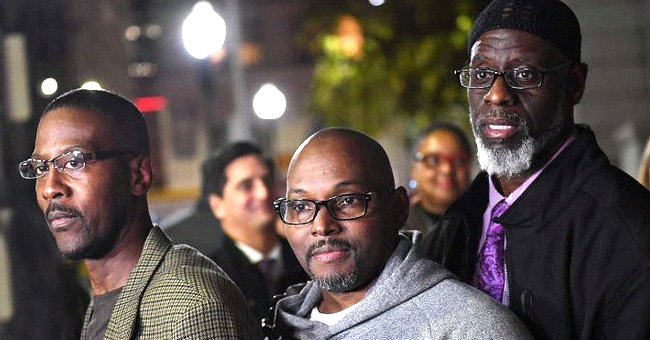
Three Baltimore Men Who Spent 36 Years in Prison for Wrongful Conviction of Ninth-Grader DeWitt Duckett's Murder Are Finally Free
Three Baltimore men have regained their freedom after spending 36 years in prison over what has now been discovered to be a wrongful murder conviction. Several discrepancies in their initial trial have since been uncovered.
Alfred Chestnut, Ransom Watkins, and Andrew Stewart had their lives turned upside down in November 1983 when they were accused of the murder of a middle school student, DeWitt Duckett.
According to CNN, Stewart was 17 while Chestnut and Watkins were 16 at the time. They were reportedly arrested after Duckett, 14, was shot and killed in a school hallway for his jacket.
"There's no way to ever repair the damage done or the trauma imposed upon these men for almost four decades."
The outlet reported that Chestnut, Stewart, and Watkins were convicted based on witness testimony and the fact that a similar jacket was found in Chestnut’s bedroom at the time. But there’s more to the story.
The trio’s teachers at the time confirmed that they were non-threatening, and school security reportedly escorted all three boys off the premises about half an hour before Duckett was murdered.
Also, the jacket found in Chestnut's bedroom – which was deemed crucial evidence at the time – was said to have been purchased by his mother.
The clothing item reportedly had no blood or gunshot residue, and the mom was able to produce a receipt, backed by the store clerk’s testimony.
Baltimore City State's Attorney Marilyn Mosby, who filed a joint petition with the men, also revealed that:
"We have intentional concealment and misrepresentation of the exculpatory evidence, evidence that would have showed that it was someone else other than these defendants."
Not only were the suspects and trial witnesses – all minors at the time – interrogated without their parents, but Chestnut’s lawyers alleged that the police also encouraged false witness testimony.
All these were hidden from the defense team and jury, including the fact that, according to Mosby, anonymous calls were identifying another shooter in Duckett’s murder.
That suspect, who has since died, was reportedly seen after the shooting confessing to the murder and wearing what looked like Duckett’s jacket. All trial witnesses in Chestnut, Watkins, and Stewart’s case have retracted their testimony, Mosby added.
She addressed the men in a recent press conference, saying:
"Today isn't a victory. Today, it's a tragedy that these men had 36 years of their lives stolen from them. There's no way to ever repair the damage done or the trauma imposed upon these men for almost four decades. You should never have seen the inside of a jail cell."
Per the New York Post, Circuit Court Judge Charles Peters also apologized to the wrongfully convicted men on behalf of the criminal justice system. Chestnut, Watkins, and Stewart were released on Monday after they were granted a writ of innocence.
"That was hell," said Chestnut, who filed the information request that helped uncover new evidence that was concealed from his attorneys during the initial trial.
Chestnut contacted Baltimore's Conviction Integrity Unit, which helped review their conviction and kick-started the journey, which resulted in their freedom.
The trio's case bears similarity to that of another Baltimore man, Sabein Burgess, who was exonerated of his girlfriend’s murder in 2015. At the time, he had spent over two decades in prison.
In 2017, Burgess was awarded $15 million after he filed a wrongful conviction suit against the Baltimore Police Department and two police detectives.
